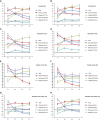Effect of a mentor-based, supportive-expressive program, Be Resilient to Breast Cancer, on survival in metastatic breast cancer: a randomised, controlled intervention trial
- PMID: 28926525
- PMCID: PMC5680471
- DOI: 10.1038/bjc.2017.325
Effect of a mentor-based, supportive-expressive program, Be Resilient to Breast Cancer, on survival in metastatic breast cancer: a randomised, controlled intervention trial
Abstract
Background: Because of medical advances, metastatic breast cancer (MBC) is now viewed as a chronic disease, rather than an imminent death sentence. Helping women live with this disease requires more than a medical approach to symptoms. Thus, a mentor-based and supportive-expressive program 'Be Resilient to Breast Cancer' (BRBC) was designed to help Chinese women with MBC enhance their resilience levels, biopsychosocial functions, and potentially extend their life span.
Methods: A total of 226 women with MBC were randomly assigned, in a 1 : 1 ratio, to an intervention group (IG) that participated in BRBC or to a control group (CG) that received no intervention. Be Resilient to Breast Cancer was conducted for 120 min once a week. Primary outcomes were cancer-specific survival and secondary outcomes were resilience, Allostatic Load Index (ALI), anxiety, depression, and quality of life (QoL). The Cox proportional-hazards model was used for survival analysis and growth mixture models were performed for secondary outcomes.
Results: Be Resilient to Breast Cancer did not significantly prolong 3- or 5-year survival (median survival, 36.7 months in IG and 31.5 months in CG). The hazard ratio for death was 0.736 (95% CI, 0.525-1.133, P=0.076; univariate Cox model) and 0.837 (95% CI, 0.578-1.211, P=0.345; multivariate Cox analysis). The IG improved in anxiety (ES=0.85, P<0.001), depression (ES=0.95, P<0.001), QoL (ES=0.55, P<0.001), resilience (ES=0.67, P<0.001), and ALI (ES=0.90, P<0.001) compared to CG.
Conclusions: BRBC does not improve survival of women with MBC in this study, though longer follow up is warranted. It positively impacts resilience, QoL, ALI, and emotional distress.
Conflict of interest statement
The authors declare no conflict of interest.
Figures



Similar articles
-
Effect of a multidiscipline mentor-based program, Be Resilient to Breast Cancer (BRBC), on female breast cancer survivors in mainland China-A randomized, controlled, theoretically-derived intervention trial.Breast Cancer Res Treat. 2016 Aug;158(3):509-22. doi: 10.1007/s10549-016-3881-1. Epub 2016 Jul 11. Breast Cancer Res Treat. 2016. PMID: 27400910 Clinical Trial.
-
Effectiveness of adjuvant supportive-expressive group therapy for breast cancer.Breast Cancer Res Treat. 2020 Feb;180(1):121-134. doi: 10.1007/s10549-020-05526-4. Epub 2020 Jan 16. Breast Cancer Res Treat. 2020. PMID: 31950384 Clinical Trial.
-
Decrease in depression symptoms is associated with longer survival in patients with metastatic breast cancer: a secondary analysis.J Clin Oncol. 2011 Feb 1;29(4):413-20. doi: 10.1200/JCO.2010.28.4455. Epub 2010 Dec 13. J Clin Oncol. 2011. PMID: 21149651 Free PMC article. Clinical Trial.
-
Effectiveness of Supportive-Expressive Group Therapy in Women with Breast Cancer: A Systematic Review and Meta-Analysis.Oncol Res Treat. 2021;44(5):252-260. doi: 10.1159/000515756. Epub 2021 Apr 28. Oncol Res Treat. 2021. PMID: 33910215
-
Predictive factors on outcomes in metaplastic breast cancer.Breast Cancer Res Treat. 2017 Oct;165(3):499-504. doi: 10.1007/s10549-017-4367-5. Epub 2017 Jul 8. Breast Cancer Res Treat. 2017. PMID: 28689362 Review.
Cited by
-
New resilience instrument for family caregivers in cancer: a multidimensional item response theory analysis.Health Qual Life Outcomes. 2021 Nov 18;19(1):258. doi: 10.1186/s12955-021-01893-8. Health Qual Life Outcomes. 2021. PMID: 34794439 Free PMC article.
-
Lifestyle coaching is feasible in fatigued brain tumor patients: A phase I/feasibility, multi-center, mixed-methods randomized controlled trial.Neurooncol Pract. 2022 Oct 14;10(3):249-260. doi: 10.1093/nop/npac086. eCollection 2023 Jun. Neurooncol Pract. 2022. PMID: 37188163 Free PMC article.
-
Relationship Between Resilience, Social Support, Existential Well-Being and Negative Emotions in Cervical Cancer Patients: a Mediation Analysis.J Cancer. 2024 Apr 29;15(11):3418-3426. doi: 10.7150/jca.91260. eCollection 2024. J Cancer. 2024. PMID: 38817854 Free PMC article.
-
Editorial: Resilience in chronic disease, volume II.Front Psychiatry. 2023 May 25;14:1209709. doi: 10.3389/fpsyt.2023.1209709. eCollection 2023. Front Psychiatry. 2023. PMID: 37304437 Free PMC article. No abstract available.
-
Allostatic Interoceptive Overload Across Psychiatric and Neurological Conditions.Biol Psychiatry. 2025 Jan 1;97(1):28-40. doi: 10.1016/j.biopsych.2024.06.024. Epub 2024 Jul 2. Biol Psychiatry. 2025. PMID: 38964530 Free PMC article. Review.
References
-
- Bonanno GA (2012) Uses and abuses of the resilience construct: Loss, trauma, and health-related adversities. Soc Sci Med 74: 753–756. - PubMed
-
- Connor KM, Davidson JR (2003) Development of a new resilience scale: the Connor-Davidson Resilience Scale (CD-RISC). Depress Anxiety 18: 76–82. - PubMed
-
- Campbell-Sills L, Stein MB (2007) Psychometric analysis and refinement of the Connor-Davidson Resilience Scale (CD-RISC): validation of a 10-item measure of resilience. J Trauma Stress 20: 1019–1028. - PubMed
-
- Edelman S, Lemon J, Bell DR, Kidman AD (1999) Effects of group CBT on the survival time of patients with metastatic breast cancer. Psychooncology 8: 474–481. - PubMed
-
- Edwards AG, Hailey S, Maxwell M (2013) Psychological interventions for women with metastatic breast cancer. Cochrane Database Syst Rev 6: CD004253–CD004253. - PubMed
Publication types
MeSH terms
LinkOut - more resources
Full Text Sources
Other Literature Sources
Medical

